2017八年级英语暑假作业第16天howoften和sometimes人教新目标版
- 格式:doc
- 大小:122.00 KB
- 文档页数:5
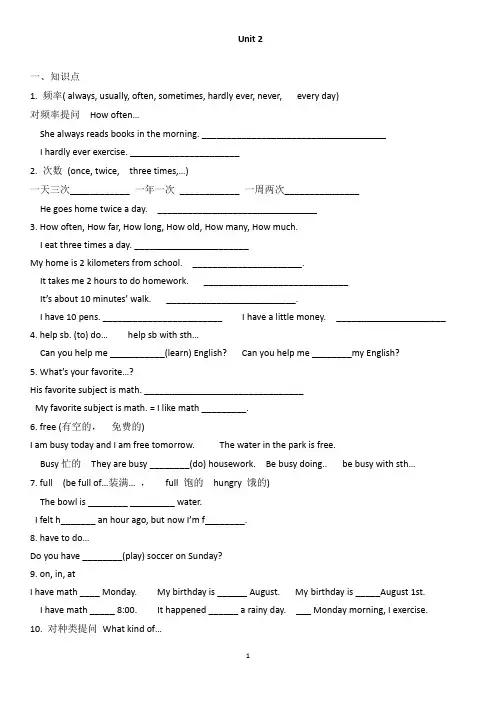
Unit 2一、知识点1. 频率( always, usually, often, sometimes, hardly ever, never, every day)对频率提问How often…She always reads books in the morning. _____________________________________I hardly ever exercise. ______________________2. 次数(once, twice, three times,…)一天三次____________ 一年一次____________ 一周两次_______________He goes home twice a day. ________________________________3. How often, How far, How long, How old, How many, How much.I eat three times a day. _______________________My home is 2 kilometers from school. ______________________.It takes me 2 hours to do homework. _____________________________It’s about 10 minutes’ walk. __________________________.I have 10 pens. ________________________ I have a little money. ______________________4. help sb. (to) do… help sb with sth…Can you help me ___________(learn) English? Can you help me ________my English?5. What’s your favorite…?His favorite subject is math. ________________________________My favorite subject is math. = I like math _________.6. free (有空的,免费的)I am busy today and I am free tomorrow. The water in the park is free.Busy忙的They are busy ________(do) housework. Be busy doing.. be busy with sth…7. full (be full of…装满… ,full 饱的hungry 饿的)The bowl is ________ _________ water.I felt h_______ an hour ago, but now I’m f________.8. have to do…Do you have ________(play) soccer on Sunday?9. on, in, atI have math ____ Monday. My birthday is ______ August. My birthday is _____August 1st.I have math _____ 8:00. It happened ______ a rainy day. ___ Monday morning, I exercise.10. 对种类提问What kind of…I’m learning swing dance. _______ _______ ________ dance are you learning?I like tomato noodles. _______ ________ _______ noodles do you like?11. at least 至少at most 至多(不超过)You must write __________ 3 diaries every week.12. want (sb.) ______(do)… would like ______(do)… feel like ________(do)… 想要做…13.提问I usually play soccer on weekends. _____________________________?She often watches TV in the evening. _____________________________?She usually sleeps for 9 hours every night. _________________________?She usually sleeps for 9 hours every night. __________________________?13. hard, hardly, hardly everShe studies ______. It’s raining ______.I ________ watch TV on school days. I can _____ hear you, please speak loudly.14. be good for… 对…有益be good at (doing) sth 擅长做… be good with… 善于与…相处be good to sb. 对…好It’s good ____ your health. I am good at _______(swim).be good for… be bad for…15. health 名词健康, healthy 形容词健康的Eating more vegetables can help you keep _________. My grandparents are __________.My grandparents are in good ________. It’s good for your _________.16. ask sb. about... 询问某人关于… ask sb. to do…要求某人做… ask sb. not to do…My mother asked my _______(clean)my room.The teacher asked us ________(not run) in the classroom.17. about doing… for doing… in doing… at doing… of doing… on doing…18. Here are the _________(结果). Here is the _________(结果).the results of… …的结果the results of the test 测试结果19. percent 百分之… (动词的选择看名词)30 percent of the students _____(be) girls. 30 percent of the water _____(be) clean. 20. not…at all 一点也不He likes apples. (用not…at all改写)He ______ _______ apples ______ _______.21. be surprised at sth…对…感到惊讶be surprised to do… 对做某事感到惊讶be surprised that 句子I am surprised at the results. I am surprised ______(meet) you here.I am surprised that he is a teacher.22. at least 至少at most 至多,不多于You must write _________ 3 diaries every week.You can watch TV for __________ 2 hours every day.23. the answer _____ the question 问题的答案24. although 表转折,不和but同时存在。
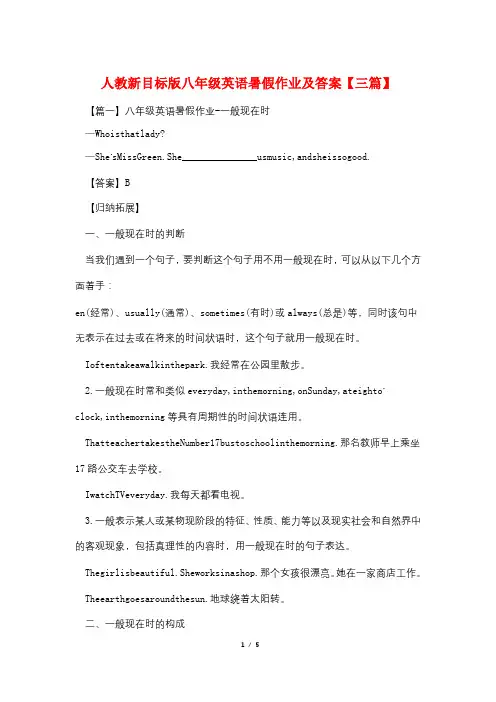
人教新目标版八年级英语暑假作业及答案【三篇】【篇一】八年级英语暑假作业-一般现在时—Whoisthatlady?—She’sMissGreen.She_______________usmusic,andsheissogood.【答案】B【归纳拓展】一、一般现在时的判断当我们遇到一个句子,要判断这个句子用不用一般现在时,可以从以下几个方面着手:en(经常)、usually(通常)、sometimes(有时)或always(总是)等,同时该句中无表示在过去或在将来的时间状语时,这个句子就用一般现在时。
Ioftentakeawalkinthepark.我经常在公园里散步。
2.一般现在时常和类似everyday,inthemorning,onSunday,ateighto’clock,inthemorning等具有周期性的时间状语连用。
ThatteachertakestheNumber17bustoschoolinthemorning.那名教师早上乘坐17路公交车去学校。
IwatchTVeveryday.我每天都看电视。
3.一般表示某人或某物现阶段的特征、性质、能力等以及现实社会和自然界中的客观现象,包括真理性的内容时,用一般现在时的句子表达。
Thegirlisbeautiful.Sheworksinashop.那个女孩很漂亮。
她在一家商店工作。
Theearthgoesaroundthesun.地球绕着太阳转。
二、一般现在时的构成在一般情况下用动词原形,假设主语为第三人称单数,一般在动词原形后加-s 或-es。
情况构成方法例词一般情况直接加-sread→readslove→lo ves以s,o,x,ch,sh结尾加-espass→passesbox→boxesteach→teacheswash→washes以辅音字母+y结尾将y变为i,再加-escarry→carriesstudy→studies不规那么变化have→hasbe→am/is/are试题推荐herewhenhe_______________(come)tovisit.2._______________yoursister_______________(know)English?3.Herhome_____________________________________________(远离)herschool.4.Thepot______________________________(notlook)likeyoursverymuch. re_______________you_______________(have)luncheveryday?6.Who_______________(想要)togoswimming?7._______________she_______________(do)thehouseworkeveryday?8.JennyandDannyusually_______________(play)gamesintheaf参考答案’tlook【篇二】八年级英语暑假作业-特殊疑问词how等特殊疑问词how等典例在线〔2022﹒贵州毕节〕—_______________doyouoftengettoschool,Michael?—Onfoot..WhatD.Where【答案】A【归纳拓展】Whattime"几点钟",对时刻进行提问。

Unit 2 How often do you exercise?你多久锻炼一次?单元知识详解Section Ahelp with housework 帮忙做家务(教材P9 1a) ①help with 帮助讲help with +表示事物的名词help with +宾格代词»My sister is only six, but she can already help with some housework.我的妹妹只有6岁,但她已经可以帮忙做一些家务了.»The task is so difficult. I need someone to help with it.这项任务很难.我需要有人来帮忙.拓help作动词时,还有以下用法:help oneself(to sth.)随便吃/喝(某物)can't/couldn't help doing sth.忍不住做某事help sb. with sth.=help sb.(to)do sth.帮助某人做某事»Dinner is ready. Help yourself, please!晚餐准备好了.请自便!»Hearing the good news, I can't help jumping.听到那个好消息,我忍不住跳了起来.»Joe helped us(to) organize the party.乔帮助我们筹备了聚会.典例1根据汉语意思完成句子,每空一词.(怀化中考改编)我经常在星期天帮助父母做家务.I often_______ my parents_________ housework on Sundays.答案:help; with/do② housework/'haʊswɜː (r) k/ n.家务劳动;家务事讲[不可数名词]是由”house + work"构成的合成词.do housework 做家务housework 前还可加the、some、much、a lot of、little等限定词.»Teenagers should do some housework after they finish their homework.青少年应该在完成家庭作业后做一些家务.拓与housework 类似的合成词还有:homework"家庭作业";schoolwork"课堂作业".sometimes 有时(教材P9 1b)③sometimes adv.有时辨sometimes, some times, sometime 与some time»Everybody needs a shoulder to cry on sometimes in life, my dear.亲爱的,在生活中,有时每个人都需要一个倾诉的对象.»I've read the article some times. It's educational.我已经把这篇文章读了几遍,它很有教育意义.»We must get together sometime.我们一定要找个时间聚一下.»After hearing that news, he remained silent for some time.听到那个消息后,他沉默了一段时间.hardly ever 几乎从不(教材P9 1b) ④ hardly ever 几乎从不讲表示频率.其中ever为副词,意为"在任何时候,从来;曾经",起强调作用.»She lives in Spain, so we hardly ever(=almost never)see her.她住在西班牙,所以我们几乎见不到她.典例2 (2023·石家庄市桥西区期中)My brother has a good habit. He_______ stays up late and he often gets up early.A. usuallyB. alwaysC. hardly everD. often解析:句意:我哥哥有一个好习惯.他几乎从不熬夜,而且经常早起.usually"通常";always"总是";hardly ever"几乎从不";often"经常".根据"My brother has a good habit"可知,此处是说"他几乎从不熬夜",故选C.⑤ hardly/'ha:(r)dli/adv.几乎不;几乎没有讲[副词]表示否定含义.谚Without accumulating, we can hardly achieve anything.不积跬步,无以至千里.辨hardly与hard语境串记I can hardly believe he is practicing hard in the yard. It's hard to exercise outside when it blows hard. 我几乎不能相信他正在院子里努力训练.当风刮得很猛烈的时候,在户外训练是很困难的.-How often do you watch TV?你多久看一次电视?-Twice a week.一周两次. (教材P10 2a) ⑥how often 多久一次讲用来提问动作发生的频率,常用表示频率的词或短语作答.»-How often do you visit your grandparents, Simon?西蒙,你多久去看望一次你的祖父母?»-Twice a month.一个月两次.拓由how构成的其他疑问短语的用法:典例3 (2022·连云港中考)-________ do you play volleyball, Amy?-Three days a week.A. How longB. How soonC. How oftenD. How much解析;由答语"Three days a week"可知,问句问的是打排球的频率,故选C. how long"多长(时间)",用于询问长度或时间;how soon"多久以后",用于询问时间,常用于一般将来时;how often"多久一次",用于询问频率;how much"多少(钱)",用于询问不可数名词的量或价格.⑦ twice/twais/adv.两次;两倍讲(1)[副词]两次(此处用法)twice a week/month/year一周/月/年两次表示频率.»I play chess at least twice a week.每周我至少下两次国际象棋.»We visited them twice in 10 years.我们十年里拜访过他们两次.(2)[副词]两倍»Cats sleep twice as much as people.猫睡觉的时间是人的两倍.拓英语中表示"三次或三次以上"用"基数词+times"结构,如:three times"三次",ten times"十次".典例4 用括号中所给词的适当形式填空.(2022·龙东中考)You'd better brush your teeth at least_______ (two) a day.解析:句意:你最好一天至少刷两次牙."一天两次"应用"twice a day",故填twice.once a week 一周一次(教材P10 2a) ⑧ once/wans/adv.一次;曾经讲(1)[副词]一次(此处用法)once a week/month/year一周/月/年一次»-How often do you play basketball with your friends?你多久与你的朋友打一次篮球?-Only once a week.一周仅一次.(扬州中考)(2)[副词]曾经表示过去不确定的时间,常与一般过去时连用.一般位于行为动词之前、系动词之后.»He once lived in Hangzhou.他曾经住在杭州.»This book was once famous, but now nobody reads it.这本书曾名噪一时,但现在却无人问津.巧学妙记次数表达法表示次数应注意,基数词后加times;一次两次很特殊,once、twice单独记.Hi, Claire, are you free next week?嗨,克莱尔,下周你有空吗? (教材P10 2d) ⑨free adj.空闲的讲[形容词]空闲的反义词为busy"忙碌的".in one's free time 在某人的空闲时间»Are you free in July?你七月份有空吗?»Free time is a good chance for teenagers to have fun.空闲时间是青少年玩乐的好机会.»Andrew often does DIY in his free time. 安德鲁在空闲时间经常自己做东西.拓[形容词]自由的;免费的»You are free to make your own choice.你可以自由做出自己的选择.»Visiting this museum is free.参观这座博物馆是免费的.Hmm...next week is quite full for me, Jack.嗯······我下周相当忙,杰克. (教材P10 2d) ⑩ full/ful/adj.忙的;满的;充满的(1)[形容词]忙的(此处用法)相当于busy,其反义词是free"空闲的".»Next week is full for me. I have lots of meetings to attend.我下周很忙,有很多会议要参加.(2)[形容词]满的;充满的其反义词是empty“空的”.be full of 充满»All in all, life is always full of beauty as long as you watch carefully,总而言之,只要你留心观察,生活总是充满美好.(宜昌中考)拓[形容词]吃饱了的其反义词是hungry"感到饿的;饥饿的".»Thank you for your delicious cake, but I am really full.谢谢你美味的蛋糕,但是我真的吃饱了.How come?怎么会呢? (教材P10 2d) ⑪ How come?怎么会呢?讲常用于英语口语中,既可独立使用,也可在其后接句子,用来询问事情的缘由或状况.»-Tom didn't come to school today.汤姆今天没有来上学.-Really? How come?真的吗?怎么会呢?»How come the sky is so blue today? 今天的天怎么会这么蓝呢?辨why 与how come两者都可意为"为什么",具体区别如下:Oh, I have to play tennis with my friends. 噢,我得跟我的朋友打网球. (教材P10 2d) ⑫have to 不得不,必须讲have to的用法:①后跟动词原形②有人称、数和时态的变化③变否定句或疑问句时要借助助动词do的适当形式»I had to finish my homework first yesterday.昨天我必须先完成我的家庭作业.»She has to look after her little brother.她不得不照顾她的弟弟.»Do I have to do the dishes now?我必须现在洗碗吗?辨have to 与must»We have to put off the sports meeting because of the bad weather.由于天气恶劣,我们不得不推迟运动会. (强调客观需要)»I must wash my hands before eating.吃饭前我必须洗手.(强调主观意识,无人强迫)典例5(2022·荆州中考)-Mike, I can't stop playing computer games.-For your eyes, my dear friend, I'm afraid you________.A. couldB. mayC. wouldD. have to解析:句意:"迈克,我玩电脑游戏停不下来.”"我亲爱的朋友,为了你的眼睛,恐怕你必须停下来."could"能够";may"可能,也许";would"将要";have to"必须,不得不".根据句意可知,此处是说"必须"停止玩电脑游戏,故选D.⑬play tennis 打网球讲play和球类运动/棋类名词连用时,球类运动/棋类名词前不加任何冠词.拓play和乐器类名词连用时,乐器类名词前通常要加定冠词the.典例6 (2022·齐齐哈尔中考)My brother Tom can play________ ping-pong well, but he can't play_______ violin.A. the;/B. the; theC./;the解析:句意;我弟弟汤姆乒乓球打得很好,但他不会拉小提琴.play后接球类运动名词时,球类运动名词前不加冠词;play后接乐器类名词时,乐器类名词前要加定冠词the.故选C.I go to the movies maybe once a month.我可能一个月去看一次电影. (教材P11 Grammar Focus) ⑭maybe /'meibi/adv.大概;或许;可能辨maybe与may beHow often do they stay up late? 他们多久熬一次夜? (教材P11 3a) ⑮ stay up 熬夜讲常与late、all night等连用.»Don't always stay up late. An unhealthy lifestyle can lead to illnesses.不要总是熬夜.不健康的生活方式会导致疾病.拓"动词+up"型的其他短语:look up查阅; 向上看make up 编造;组成put up 张贴set up 建立pick up 捡起; (开车)接人take up占据;开始从事典例7完成句子,每空一词.(2022,重庆中考B卷)学生不应该熬夜,因为他们需要充足的睡眠.Students should not________ _________ because they need enough sleep.解析:表示"熬夜"应用stay up;由空前的should not 可知,此处应用动词原形.故填stay up.He plays at least twice a week.他每周至少踢两次(足球). (教材P11 3a) ⑯16 at least 至少;不少于;起码讲其反义短语是at most"至多;不超过".»You should sleep for at least eight hours every day.你每天应该至少睡八个小时.»You can borrow at most three books once. 你一次最多可以借三本书.⑰least/li:st/ adv.最小;最少adj.& pron.最小的;最少的讲(1)[副词]最小;最少(此处用法)»Blood type AB is the least common among the four types of blood.四种血型中,AB型血最不常见.(2)[形容词]&[代词]最小的;最少的»He made the least trash in our family.在我们家,他制造垃圾最少.Section BShe says it's good for my health.她说那对我的健康有益. (教材P12 1b) ① be good for 对······有益讲后接名词、代词或动词-ing形式,其反义短语为be bad for"对······有害".语境串记Eating too much is bad for your health. You should do more exercise. It is good for your health.吃太多对你的健康有害.你应该多运动.那对你的健康有益.拓其他常见的由"be good+介词”构成的短语:»Our head teacher is good to all of us.我们的校长对我们都很好.»Tom is very good at telling stories. 汤姆很擅长讲故事.»He's very good with children.他对孩子很有一套.典例1 (滨州中考改编)-I think washing hands every day is good________ our health.-Yes, I agree with you.A. toB. withC. forD. at解析:be good to"对······友好";be good with"善于应付····";be good for"对······有益";be good at"擅长”.根据空后的our health 可知,此处表示"有利于我们的健康",故用be good for,选C.②health/hel0/n.健康;人的身体(或精神)状态讲[不可数名词]be in good/poor health 身体好/差»Smoking does harm to health.吸烟有害健康.»My grandma is in good health.我祖母身体很好.Here are the results.这是(调查的)结果. (教材P13 2b) ③ here/there 开头的倒装句讲here/there开头的倒装句+主语:名词here/there开头的倒装句+谓语动词:be/come/go等»Here is your pen.这是你的钢笔.»Here comes the bus.公共汽车来了.特别提醒here/there位于句首时,若句子主语为人称代词,主谓不用倒装.»Here he comes.他来了.④result/ri'zalt/n.结果;后果讲[名词]结果;后果常用短语有:as a result 结果;因此as a result of 由于the result of······的结果»As a result, my speech was a success.结果,我的演讲很成功.»As a result of money shortage, many small companies closed down.由于资金短缺,许多小公司倒闭了.»This book is the result of 25 years' research.这本书是25年研究的结果.拓[名词]得分,成绩When do you get your exam results? 你什么时候知道考试成绩?典例2 (孝感中考)-Do you know Liu Hui finally entered a top school?-Certainly. That's the________ of his hard work.A. habitB. suggestionC. resultD. decision解析:habit"习惯";suggestion"建议";result"结果";decision"决定".根据语境可知,刘辉最终进入了一所顶尖学校,那是他努力学习的"结果",故所缺的词是result,选C.We found that only fifteen percent of our students exercise every day.我们发现只有15%的学生每天锻炼.(教材P13 2b) ⑤ percent/pə(r)'sent/n.百分之······单复数同形,如:»one percent 百分之一»thirty percent百分之三十拓"基数词+percent+ of +(限定词+)名词/代词"结构作主语时,谓语动词的单复数由of后名词或代词的单复数决定.»Twenty percent of the students agree with you.百分之二十的学生赞同你的看法.»Thirty percent of the time has passed.百分之三十的时间已经过去了.典例3用括号中所给词的适当形式填空.Almost fifty percent of the students in our class________ (be)born in 2010.解析:句意;我们班几乎百分之五十的学生出生于2010年.students是可数名词复数,谓语动词应用复数形式;由时间状语"in2010"可知,时态为一般过去时.故填were.And twenty percent do not exercise at all!另外20%的学生根本不锻炼!(教材P13 2b) ⑥ not.,. at all 根本不;一点儿也不讲表示强烈的否定,not常位于连系动词be、助动词或情态动词之后,at all通常位于句尾.»We don't know each other at all, but the bright smiles bring us closer.我们根本不认识彼此,但是灿烂的笑容让我们更加亲密.拓not at all 不用谢;没关系,一点也不介意常用来回答道歉或感谢.»-Thank you for your kindness.非常感谢你的好意.-Not at all.不客气.»-Would you mind if I sit here?你介意我坐在这里吗?-Not at all.一点也不介意.We all know that many students often go online...我们都知道许多学生经常上网······(教材P13 2b)⑦ online/on'lain/,/a:n'lain/ adj.& adv.在线(的);联网(的)(1)[副词]在线;联网(此处用法)»It is faster if you apply online.如果你在网上申请的话会更快一些.(2)[形容词]在线的;联网的»We plan to build an online database.我们打算建立一个在线数据库.语境串记Online shopping is both cheap and convenient, so many people like shopping online.网上购物既便宜又方便,因此许多人喜欢在网上购物.The answers to our questions about watching television were also interesting.我们提出的关于看电视这个问题的回答也很有趣. (教材P13 2b) ⑧the answer to........·的答案/回答讲此处to意为"(表示两人或事物之间的关系)属于,关于",还常用于以下短语:the key to...······的钥匙/答案/关键the solution to...·····的解决办法/答案the ticket to...·····的票»Your answer to the question is quite right.你对这个问题的回答相当正确.»Can you find the key to the door?你能找到门的钥匙吗?⑨interesting adj.有意思的,有趣的辨interesting 与interested语境串记The interesting little girl is interested in the interesting book.这个有趣的小女孩对这本有趣的书感兴趣. Although many students like to watch sports, game shows are the most popular.尽管很多学生喜欢看体育节目,但是游戏类节目却是最受欢迎的. (教材P13 2b) ⑩ although/o:l'ðəu/conj.虽然;尽管;即使讲[连词]相当于though,引导让步状语从句.»Although the story was simple, it was educational.尽管这个故事很简单,但它很有教育意义.特别提醒在英语中,表示“虽然······但是·····."时,although/though不能和but同在一个句子中使用.»尽管这台机器老旧了,但是它依然运转得很好.Although the machine is old, it still runs well. =The machine is old, but it still runs well.典例4 (2023·石家庄市新华区期中)_______ the children were tired, they still kept walking up to the top of the mountain.A. AlthoughB. BecauseC. SoD. However解析:句意:尽管孩子们累了,但是他们仍然继续向山顶走去.although"尽管";because"因为";s"因此";however"无论,然而".根据"they still kept walking up to the top of the mountain"可知,此处表示"尽管累了,但仍然继续向山顶走去",应用although 引导让步状语从句.故选A.It is good to relax by using the Internet or watching game shows, but we think the best way to relax is through exercise.通过使用互联网或看游戏类节目来放松很好,但是我们认为最好的放松方式是通过锻炼.(教材P13 2b)⑪by prep.通过讲[介词]表示方式,后可接名词、代词或动词-ing形式.»She made the toy by hand.她手工制作了这个玩具.»In class, you can discuss problems by working in groups.在课堂上,你们可以通过小组活动讨论问题.典例5 (2022·云南中考)-How do you relax in your free time?-_______ doing sports and listening to music.A. AtB. OnC. InD. By解析:句意;"你在空闲时间怎么放松?""通过做运动和听音乐."根据答语可知,问句问的是空闲时间的放松方式,故设空处应用By,选D.常在单项选择、完形填空中考查through与其他介词的辨析⑫ through/θru:/ prep.以;凭借;穿过(1)[介词]以;凭借(此处用法)表示方式.»I knew the news through the Internet.我是从互联网上知道这个消息的.(2)[介词]穿过;通过多指穿过门、窗、洞、森林、城市、隧道等.»The River Thames flows through London.泰晤士河流经伦敦.辨across, through, over 与cross拓[介词]自始至终,从头到尾»He acted so well that people just couldn't stop laughing through the movie.他演得如此好,以至于人们看电影时从头到尾笑个不停.典例6 (2022·武汉中考)You can only achieve success_______ hard work.A. acrossB. aboveC. throughD. into解析:句意;你只有努力工作才能取得成功. through"以,凭借"符合题意,故选C. across“从····一边到另一边,横过",above"在·····.上面",into"到·····里面",均与语境不符.⑬ the best way to do sth.做某事最好的方式»A handmade gift is the best way to show your love.手工制作的礼物是表达爱意的最佳方式.It is healthy for the mind and the body.它对身心健康有益. (教材P13 2b)⑭mind/maind/n.头脑;心智»There were all kinds of thoughts running through my mind.各种念头在我脑海中闪过.»He has a quick mind. 他思维敏捷.拓(1)[名词]富有才智的人»She was one of the greatest minds in her time.她是她那个时代最富有才智的人之一.(2)mind作名词时的相关短语:change one's mind 改变某人的主意make up one's mind 下定决心;决定keep...in one's mind 牢记······Exercise such as playing sports is fun, and you can spend time with your friends and family as you play together.像做体育运动这样的锻炼是很有趣的,并且当你和朋友、家人一起运动的时候,你们可以共度时光.(教材P13 2b) ⑮such as 例如;像······这样辨such as 与for example»She does well in many subjects, such as math, physics and chemistry.她很多学科都学得好,例如数学、物理学和化学.»I'd like to keep a pet, for example, a cat.我想养个宠物,比如一只猫.⑯spend v.度过;花费讲[及物动词]度过(此处用法)还可表示"花费(金钱)".常用于以下结构:spend time with sb.和某人共度时光sb. spends time/money on sth.某人在某物上花费时间/金钱sb. spends time/money doing sth.某人花费时间/金钱做某事»I like to spend time with my friends on weekends.我喜欢周末和朋友待在一起.»It's clear that our students spend a lot of time on screens.很明显,我们的学生在屏幕上花了很多时间.»The young player spends four hours practicing volleyball every day.这位年轻的运动员每天花四个小时练习排球.⑰ together/tə'geðə(r)/adv.在一起;共同»We grew up together.我们是一起长大的.拓together with 和······一起,连同当主语后跟together with 短语时,谓语动词应与该短语前的主语在人称和数上保持一致.»Mr. Green together with his children goes to the park every Sunday.格林先生和他的孩子每周日去公园.So start exercising before it's too late!所以不要等到太晚才开始锻炼!(教材P13 2b) ⑱before 引导的时间状语从句讲before[连词]在·····之前引导时间状语从句.»Before I left, I asked her to give it to anyone else in need of the umbrella.在我离开之前,我让她把雨伞送给其他需要它的人.»Let's take action before it is too late.趁还来得及,咱们采取行动吧.拓before[介词]在······以前其后可接名词或代词.»In China, people usually clean up their houses to sweep away bad luck before the SpringFestival.在中国,人们通常在春节前打扫房子以扫除厄运.典例7 Please make sure the news is true_________ you spread(传播)it.A. beforeB. afterC. untilD. because解析:句意:在传播之前,请确保消息是真实的.before"在······之前";after"在······之后";until"直到······为止";because"因为".结合常识可知,应该是传播之前确保消息真实,故此处应用before,选A.Go to the dentist 去看牙医(教材P15 3a) ⑲go to the dentist 去看牙医讲相当于go to the dentist's或see a dentist.»You'd better go to the dentist('s) if you have a toothache.如果你牙疼,你最好去看牙医.拓在英语中,表示职业的名词后加-'s,可以表示地点.»go to the doctor's去看医生»go to the baker's 去面包店»go to the barber's 去理发店Jane is a 16-year-old high school student in the United States.简是一名16岁的美国中学生. (教材P15 3a)⑳复合形容词讲由两个或两个以上的单词构成,词与词之间常加连字符"-".此处,16-year-old是由"基数词-可数名词单数-形容词"构成的复合形容词,意为“十六岁的”,常用在名词前作定语,而16 years old 常用作表语.»I have a 16-year-old sister.我有一个16岁的姐姐.»My sister is 16 years old.我姐姐16岁了.典例8 (绥化中考)Liu Yu, a________ boy from Shandong, is a running star.A. fifteen-years-oldB. fifteen years oldC. fifteen-year-old解析:句意;刘宇,一个来自山东的15岁男孩,是一个跑步明星.空处作定语修饰boy,应用复合形容词,其结构为"基数词-可数名词单数-形容词".故选C。
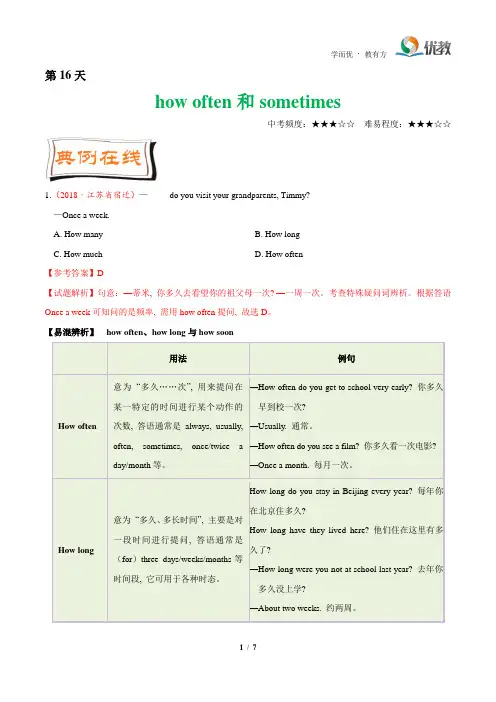
第16天how often和sometimes中考频度:★★★☆☆难易程度:★★★☆☆1.(2018﹒江苏省宿迁)—_____do you visit your grandparents, Timmy?—Once a week.A. How manyB. How longC. How muchD. How often【参考答案】D【试题解析】句意:—蒂米, 你多久去看望你的祖父母一次? —一周一次。
考查特殊疑问词辨析。
根据答语Once a week可知问的是频率, 需用how often提问, 故选D。
【易混辨析】how often、how long与how soon用法例句How often意为“多久……次”, 用来提问在某一特定的时间进行某个动作的次数, 答语通常是always, usually,often, sometimes, once/twice aday/month等。
—How often do you get to school very early? 你多久早到校一次?—Usually. 通常。
—How often do you see a film? 你多久看一次电影?—Once a month. 每月一次。
How long意为“多久、多长时间”, 主要是对一段时间进行提问, 答语通常是(for)three days/weeks/months等时间段, 它可用于各种时态。
How long do you stay in Beijing every year? 每年你在北京住多久?How long have they lived here? 他们住在这里有多久了?—How long were you not at school last year? 去年你多久没上学?—About two weeks. 约两周。
How soon 意为“还要多久”, 是对从某个基本时间到将来某动作结束或某动作发生这段时间提问, 常用在一般将来时态的句子中, 其答语通常是“in + 一段时间”。
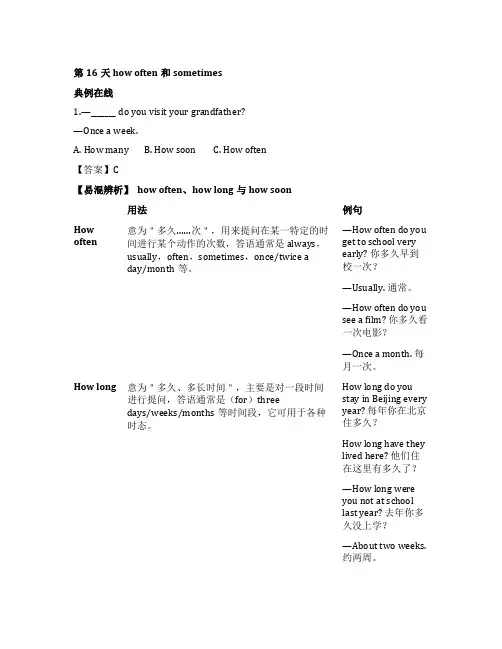
第16天 how often和sometimes典例在线1.—_______ do you visit your grandfather?—Once a week.A. How manyB. How soonC. How often【答案】C【易混辨析】 how often、how long与how soon用法例句How often 意为"多久……次",用来提问在某一特定的时间进行某个动作的次数,答语通常是always,usually,often,sometimes,once/twice aday/month等。
—How often do youget to school veryearly? 你多久早到校一次?—Usually. 通常。
—How often do yousee a film? 你多久看一次电影?—Once a month. 每月一次。
How long意为"多久、多长时间",主要是对一段时间进行提问,答语通常是(for)threedays/weeks/months等时间段,它可用于各种时态。
How long do you stay in Beijing every year? 每年你在北京住多久?How long have they lived here? 他们住在这里有多久了?—How long were you not at school last year? 去年你多久没上学?—About two weeks. 约两周。
How soon意为"还要多久",是对从某个基本时间到将来某动作结束或某动作发生这段时间提问,常用在一般将来时态的句子中,其答语通常是"in+ 一段时间"。
—How soon can you finish the work? 还要多久你能完成这项工作?—In half an hour. 半小时后。
2. Maybe our English teacher will ask me to finish the homework _______________ today, but I guess he will forget it _______________ because he is very busy. A. sometime;some times B. sometime;sometimesC. some time;sometimeD. some times;some time【答案】B【易混辨析】 sometimes、sometime、some time与some times用法例句sometimes是个频度副词,意为"有时候",多用于一般现在时,对它进行提问常用how often。
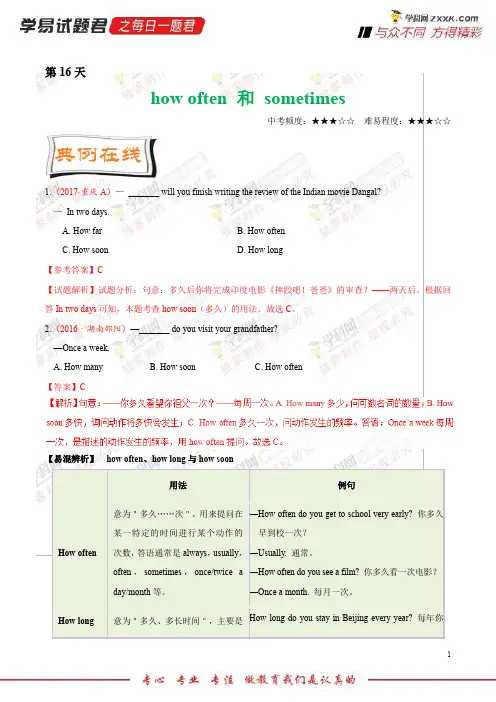
1 第16天how often 和 sometimes中考频度:★★★☆☆ 难易程度:★★★☆☆1.(2017·重庆A )— _______ will you finish writing the review of the Indian movie Dangal?— In two days.A. How farB. How oftenC. How soonD. How long 【参考答案】C【试题解析】试题分析:句意:多久后你将完成印度电影《摔跤吧!爸爸》的审查?——两天后。
根据回答In two days 可知,本题考查how soon (多久)的用法。
故选C 。
2.(2016﹒湖南邵阳)—_______ do you visit your grandfather?—Once a week.A. How manyB. How soonC. How often【答案】C【易混辨析】 how often 、how long 与how soon 用法 例句How often 意为"多久……次",用来提问在某一特定的时间进行某个动作的次数,答语通常是always ,usually ,often ,sometimes ,once/twice a day/month 等。
—How often do you get to school very early? 你多久早到校一次? —Usually. 通常。
—How often do you see a film? 你多久看一次电影?—Once a month. 每月一次。
How long 意为"多久、多长时间",主要是How long do you stay in Beijing every year? 每年你。
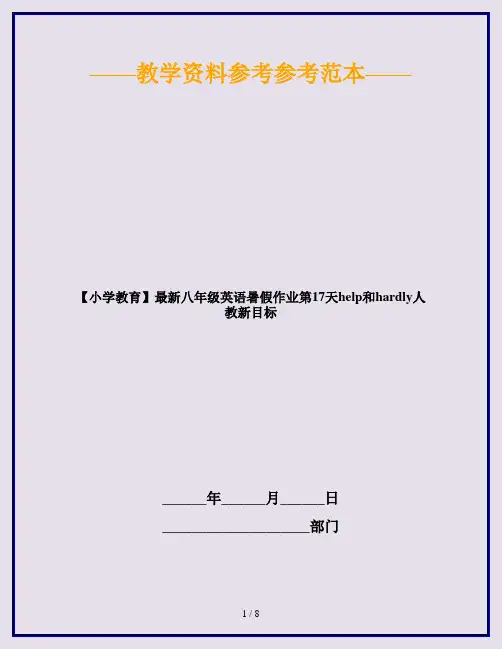
——教学资料参考参考范本——【小学教育】最新八年级英语暑假作业第17天help和hardly人教新目标______年______月______日____________________部门典例在线—Do you like your friends?—Yes。
One of my friends often ______ me______ my homework in class。
A。
help;withB。
help;to doC。
helps;doingD。
helps;with【答案】D【归纳拓展】help的用法(1)help with sth意为"帮助做某事"。
Can you help him with this work? 你能帮助他完成这项工作吗?(2)help sb with sth = help sb(to)do sth意为"帮助某人做某事"。
I often help him with his English。
=I often help him (to) learn English。
我经常帮助他学习英语。
(3)help oneself(to)自用(食物等)。
Help yourself to the fish。
请随便吃鱼。
(4)help sb。
out 帮助某人克服困难,渡过难关、解决问题、完成工作。
When I’m in trouble, he always helps me out with money。
每当我处境困难时,他总是用金钱帮助我渡过难关。
(5)can’t/couldn’t help doing sth 情不自禁做某事She couldn’t help crying。
她忍不住哭了。
2。
(20xx﹒山东滨州)—Can you catch what I said?—Sorry, I can ____________ understand it because you speak very quickly。
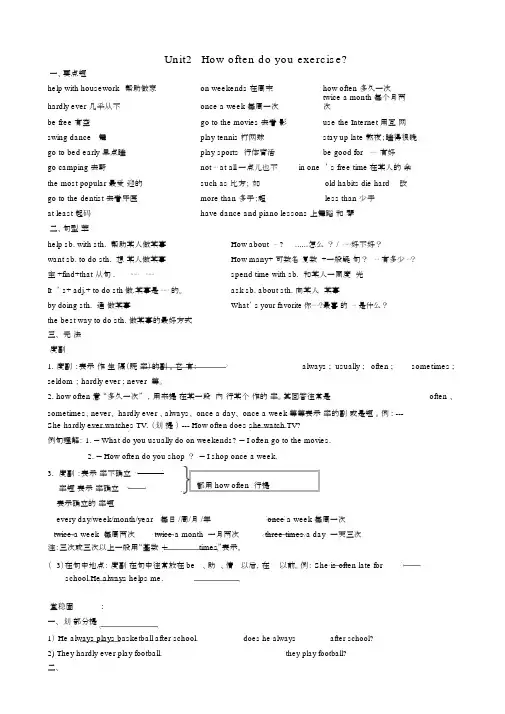
Unit2How often do you exercise?一、要点短help with housework帮助做家on weekends 在周末how often 多久一次hardly ever 几乎从不once a week 每周一次twice a month 每个月两次be free 有空go to the movies 去看影use the Internet 用互网swing dance 舞play tennis 打网球stay up late 熬夜;睡得很晚go to bed early 早点睡play sports 行体育活be good for ⋯⋯有好go camping 去野not ⋯ at all一点儿也不in one ’ s free time在某人的余the most popular 最受迎的such as 比方;如old habits die hard 改go to the dentist 去看牙医more than 多于;超less than 少于at least 起码have dance and piano lessons 上舞蹈和琴二、句型萃help sb. with sth. 帮助某人做某事How about ⋯ ?......怎么? / ⋯⋯好不好?want sb. to do sth. 想某人做某事How many+ 可数名复数 +一般疑句?⋯有多少⋯?主 +find+that 从句 .⋯⋯⋯⋯spend time with sb. 和某人一同度光It ’ s+ adj.+ to do sth做.某事是⋯⋯的。
ask sb. about sth. 向某人某事by doing sth. 通做某事What’ s your favorite你⋯⋯?最喜的⋯ 是什么?the best way to do sth. 做某事的最好方式三、元法度副1.度副:表示作生隔(既率)的副。
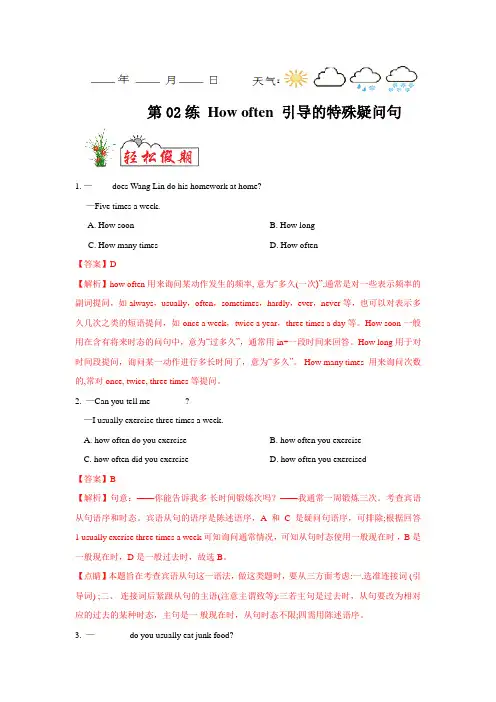
第02练How often 引导的特殊疑问句1. —____ does Wang Lin do his homework at home?—Five times a week.A. How soonB. How longC. How many timesD. How often【答案】D【解析】how often用来询问某动作发生的频率, 意为“多久(一次)”,通常是对一些表示频率的副词提问,如always,usually,often,sometimes,hardly,ever,never等,也可以对表示多久几次之类的短语提问,如once a week,twice a year,three times a day 等。
How soon一般用在含有将来时态的问句中,意为“过多久”,通常用in+一段时间来回答。
How long用于对时间段提问,询问某一动作进行多长时间了,意为“多久”。
How many times用来询问次数的,常对once, twice, three times 等提问。
2. —Can you tell me________?—I usually exercise three times a week.A. how often do you exerciseB. how often you exerciseC. how often did you exerciseD. how often you exercised【答案】B【解析】句意:——你能告诉我多长时间锻炼次吗?——我通常一周锻炼三次。
考查宾语从句语序和时态。
宾语从句的语序是陈述语序,A和C是疑问句语序,可排除;根据回答1 usually exerise three times a week可知询问通常情况,可知从句时态使用一般现在时,B是一般现在时,D是一般过去时,故选B。
【点睛】本题旨在考查宾语从句这一语法,做这类题时,要从三方面考虑:一.选准连接词 (引导词) ;二、连接词后紧跟从句的主语(注意主谓致等):三若主句是过去时,从句要改为相对应的过去的某种时态,主句是一般现在时,从句时态不限;四需用陈述语序。
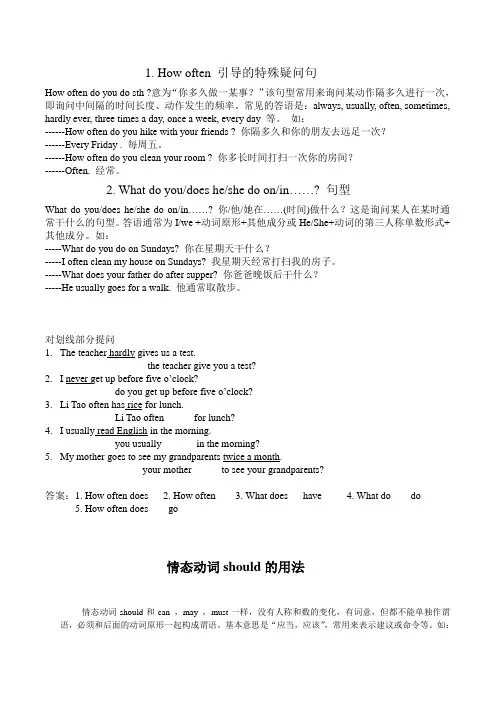
1. How often 引导的特殊疑问句How often do you do sth ?意为“你多久做一某事?”该句型常用来询问某动作隔多久进行一次,即询问中间隔的时间长度、动作发生的频率。
常见的答语是:always, usually, often, sometimes, hardly ever, three times a day, once a week, every day 等。
如:------How often do you hike with your friends ? 你隔多久和你的朋友去远足一次?------Every Friday . 每周五。
------How often do you clean your room ? 你多长时间打扫一次你的房间?------Often. 经常。
2. What do you/does he/she do on/in……? 句型What do you/does he/she do on/in……? 你/他/她在……(时间)做什么?这是询问某人在某时通常干什么的句型。
答语通常为I/we +动词原形+其他成分或He/She+动词的第三人称单数形式+其他成分。
如:-----What do you do on Sundays? 你在星期天干什么?-----I often clean my house on Sundays? 我星期天经常打扫我的房子。
-----What does your father do after supper? 你爸爸晚饭后干什么?-----He usually goes for a walk. 他通常取散步。
对划线部分提问1.The teacher hardly gives us a test._____ _____ ______ the teacher give you a test?2.I never get up before five o’clock?_____ _____ do you get up before five o’clock?3.Li Tao often has rice for lunch._____ _____ Li Tao often _____ for lunch?4.I usually read English in the morning._____ _____ you usually ______ in the morning?5.My mother goes to see my grandparents twice a month._____ _____ _____ your mother _____ to see your grandparents?答案:1. How often does 2. How often 3. What does have 4. What do do5. How often does go情态动词should的用法情态动词should和can ,may ,must一样,没有人称和数的变化,有词意,但都不能单独作谓语,必须和后面的动词原形一起构成谓语。
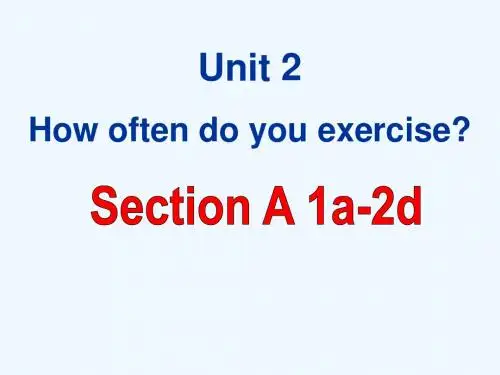
2023年【暑假分层作业】八年级英语(人教版)第04练频度副词一、单项选择1.—Mrs Lin is popular among the students.—Yes. Her classes are ________ lively and interesting.A .seldomB .alwaysC .hardlyD .never2.We should forget those heroes who fought and gave their lives for our country.A .sometimesB .seldomC .alwaysD .never3.—Why does Tony ________ eat ice -cream at night?—Because he knows it’s bad for his teeth.A .alwaysB .neverC .usuallyD .sometimes4.Jenny always goes to school early every morning. She is ________ late for school.A.usually B.never C.sometimes5.—Would you like to have a hamburgers for lunch?—No,thanks. I ________ eat hamburgers. They are not good for us.A.always B.sometimes C.never6.Li Lei likes swimming best. So he ________ goes swimming after school.A.never B.seldom C.always7.—I heard you made a new family rule “Put away your phone while at home”.—Yes. We were ________ busy checking our phones before, but now we enjoy communicating with our family.A.always B.never C.hardly ever D.sometimes8.—How often does Sam go to the sports center?—He ________ goes there. He is always busy with his study.A.usually B.hardly C.often D.always9.—Did you go to the beach with them yesterday?—No, I ______ go there. You know, I can’t swim.A.sometimesB.often C.never D.usually10.Mike always goes to school early. He’s ________ late for class.A.usually B.often C.sometimes D.never11.—Leo, why did you lie to that poor woman?—You know, being honest is important, but it is ________ necessary to tell a lie. A.always B.sometimes C.hardly D.never12.—How often do you eat junk food?—_________. It’s bad for my health.A.Never B.Always C.Usually D.Sometimes13.My mother ________ uses electronic products because she thinks they are bad for her eyes.A.usually B.seldom C.often D.always14.Children should ________ remember safety must come first no matter where you are. A.sometimesB.never C.always D.seldom15.The people in the neighborhood all like Mr. Johnson because he’s kind and ________ hurts others.A.always B.usually C.sometimes D.never16.—How do you like the high-speed train in China, Maggie?—Oh, it runs very fast and it’s ________ late.A.always B.almost C.seldom D.already17.The doctor in our neighborhood always says that early to bed and early to rise makes a man healthy, so I ________ stay up too late.A.often B.seldom C.always D.sometimes18.I get up early, so I ________ exercise in the morning.A.never B.seldom C.often D.hardly ever19.Mr. Black is so busy that he _________ does the housework at home.A.seldom B.always C.often D.usually20.Nowadays, teenagers often follow their favourite stars. That’s why the stars should ________ behave well.A.always B.sometimes C.never二、完形填空Dear e-diary,30 SeptemberI had a strange dream recently. In the afternoon, when I was on the bus coming home 21 school, I began to relax, 22 then fell asleep and I started to dream.In the dream, it was the 23 2080 and I was working at a company. While I 24 , someone stole my car. I felt angry and 25 . My CJ5 was an electronic car. It could fly 26 than any other car in the sky.In my dream, I met my best friend Andy. He told me about his wonderful 27 . On Monday, Andy got a present from his friend. It was a computer watch, so now he is 28 on the Internet. On Tuesday, his friends gave him a surprise birthday party when he 29 home. On Wednesday, Andy met Kathy, an all school fried. Kathy offered Andy a 30 in her company. On Thursday, Andy got an email from the supermarket manager. The email told him that 31 had won a prize, and it was a CJ5. Andy 32 me to go and I picked up the car with him.Just then, I felt 33 touch me on the shoulder. A kind, old lady was telling me to34 the bus. So that’s where my dream ended. I’ll never know 35 I got my beautiful CJ5 back.21.A.to B.from C.at D.in22.A.and B.but C.so D.or23.A.time B.day C.year D.evening24.A.work B.am working C.would work D.was working25.A.sad B.excited C.frightened D.nervous26.A.fast B.faster C.fastest D.the fastest27.A.dream B.car C.week D.company28.A.always B.never C.hardly D.even29.A.went B.flew C.left D.arrived30.A.room B.reason C.shape D.job31.A.she B.he C.it D.you32.A.made B.enjoyed C.let D.asked33.A.someone B.anyone C.everyone D.no one34.A.get on B.get off C.get down D.get up35.A.as soon as B.until C.if D.though三、语法填空阅读下面短文,在空格处填入一个适当的词或使用括号中的词语的正确形式填空。
【关键字】英语Unit 2 How often do you exercise词语与句子一、词组1.do housework做家务活2.hardly ever几乎不曾3.once a week每周一次4.three thimes a day 每天三次5.once or twice a week每周一两次6.one to four times a month每月一至四次7.surf/sɜ:f/the Internet/go online上网8.be full of …装/挤/充满了……9.play on the swings荡秋千10.at least至少11.drink coffee喝咖啡12.be/keep in good health身体健康13.be/keep in bad health身体欠佳14.keep healthy保持健康15.twenty percent百分之二十16.nine percent of the money 百分之九的钱17.through your work 凭你的工作18.go through the village穿过村庄19.mind doing sth介意/反对做某事20.such a good girl/so good a girl如此好的一个女孩21.such as 像……这样22.enjoy studying together喜欢一起学习23.see the dentist/go to the dentist看牙医24.read magazines看杂志25.more than /over 10 farmers十多个农民26.less than five writers不到五位作者27.how often多久一次28.Animal World动物世界29.have dance and piano lessons上舞蹈和钢琴课30.want sb to do sth想要某人做某事31.be good for...对......有好处32.be good at /do well in 擅长于……在……方面做得好33.be good with … 对……有办法,同……相处得融洽34.be friendly /kind/nice/good…to…对……友好e the Internet使用网络36.ask sb about sth询问某人有关某事37.in one’s free time在某人的空闲时间e of the Internet网络的使用39.not…at all一点也不40.the other ten percent其余百分之十41.the answer to our questions我们问题的答题42.by using the Internet借助使用因特网43.the best way to do sth做某事最好办法44.spend time with sb和某人一起度时光45.old habits die hard旧习难除46.how many parcent of the students百分之几的学生47.a 16-year-old high School Student一名16岁的高中生48.stay up late熬夜49.sleep late睡懒觉50.almost every day几乎每天e up 升起52.No.5 High School五高53.for fun为了娱乐54.fast food 快餐二.句子1.You can do it .你能行2.What do you usually do on weekends?周末你通常做什么?3.What does she do on weekends?周末她通常做什么?4.I always go to the movies.我总是去看电影5.She sometimes goes shopping.她有时去购物。
how 类特殊疑问词&频率副词(作业)( )1.—do you read Englishnewspapers?—I read 21st Century every day.A.Howlong B.HowoftenC.Howmany D.Howmuch( )2.do you spend on your homework everyday?A.Howoften B.HowlongC.Howmany D.Howmuch ( )3.—are theapples?—Four yuan a kilo.A.Howmany B.HowmuchC.Howheavy D.Howexpensive ( )4.—is the yellowriver?—Sorry,I don’t know. Let’s ask Mr.Wang. A.Howlong B.HowfarC.Howmany D.Howmuch ( )5.—are thetwins?—They are 12.A.Howlong B.HowoftenC.Howold D.Howmuch ( )6.—yogurt do youneed?—Three cups.A.Howlong B.HowfarC.Howmany D.Howmuch ( )7.—?—Fifteen yuan.A.How many people are there in your family B.How much is this T-shirtC.What’s your telephone number D.What’syour QQ number1 / 6( )8.—the weather lastMonday?—It was sunny.A.Howwas B.What’sC.Whatwas D.Howis2 / 6( )9. Although Bill isn’t rich enough, heoften_moneyto thepoor .A.will give B.was giving C.gives D.gave( )10. Nowmyfatherhis bike to work every day insteadof(而不是) driving.A.ride B.rode C.rides D.will ride ( )11.—does he do on theweekend?—He often helps his mother with houseworkA.How B.Howoften C.Howmuch D.What ( )12.—Did John e early thismorning?—Yes, hedid.Heoftento schoolearly.A.e B.es C.came D.h as e ( )13.—Miss Gao is very popular with herstudents.—Yes. Herclassesarelivelyandinteresting. A.seldomB.never C.sometimes D.always ( )14.Icouldsolve the problem without yourhelp. A.alwaysB.sometimes C.hardly D.often ( )15.—I didn’t know you take a bus to school.—Oh,Itake a bus, but it issnowingtoday.A.hardly B.Never C.sometimes D.usually( )16.Iride a bike to school.But this morning I tooka taxi becauseI got uplate.A.sometimes B.never C.seldom D.usually ( )17. Tomreadsbooks_.Thisishislifestyle.A.everyday,everyday B.everyday,everyday C.every day,everyday D.everyday,everyday( )18. Helen was so excited at the news that shecould_saya word .3 / 6A.ever B.almost C.hardly D.always ( )19.—Do you think yesterday’s math problem wasdifficult?—Yes.Icould_ work itout.A.hardly B.easily C.finally D.nearly ( )20. The Internet is very useful forus.Wecanfindinformation.A.easy B.easily C.hard D.hardly4 / 6( )21.One Saturday, the boy got up earlyandworkeduntil evening, just like any otherfarmer.A.hard B.hardly C.easily D.difficultly ( )22.The use of mobile phones in school brought teachers much trouble intheclassroom.students used mobilephone messages to cheatduringexams.A.Sometimes B.SometimeC.Sometimes D.Sometime5 / 66 / 6。
姓名:班级:家长签字:七年级暑期自学学案Unit 1 How often do you exercise?第1课时 Unit 1 Section A 1a-2cTeacher's words : Practice makes perfect.【Learning objectives】Knowing : 本课的11个单词与9短语Habit----forming: ① A: What do you usually do on weekends?B: I often go to the movies.② A: How often do you watch TV? B: Twice a weekPractising: 熟练运用本课词汇及句型谈论活动及其发生的频率。
.【Important points】频率词汇及询问活动频率【Difficult points】一般现在时态的熟练运用【Learning process】一、自主学习Task 1. 学习1a-1c:谈论日常行为活动1、看图画,写出活动词汇a __________________b __________________ c___________________d __________________e go skateboarding2、了解下列频率副词,写出其汉意always (100%) usually (80%) often (30-50%)sometimes (20%) hardly ever(5%) never (0%)听听力,与1中的活动完成搭配。
(只写1中的字母代号)always_____usually _____often____ sometimes ____ hardly ever_____ never ___3、两人一组,利用短语;仿照下列句型谈论日常活动。
(注意;第三人称替换)A: What do you usually do on weekends? B: I often go to the movies.A: What does he usually do on weekends? B: He often goes skateboarding.Task 2. 学习2a-2c:学习频率副词,利用How often.........?句型谈论活动频率。
第16天 how often和sometimes 典例在线
1.(2016﹒湖南邵阳)—_______ do you visit your grandfather? —Once a week.
A. How many
B. How soon
C. How often 【答案】
C
2. Maybe our English teacher will ask me to finish the homework _______________ today, but I guess he will forget it _______________ because he is very busy. A. sometime ;some times
B. sometime ;sometimes
C. some time ;sometime
D. some times ;some time
方法技巧
sometime, sometimes, some time, some times用法区别记忆口诀
分开"一段时间"(some time)
相聚"某个时侯"(sometime)
分开S是"倍数"(some times)
相连S是"有时"(some times)
试题推荐
I. 用 sometimes, some time, sometime或 some time 填空
1. —Will you stay in Beijing for __________?
—Yes, I will.
2. __________ he goes to school by bike and __________ by bus.zx.xk
3. The museum was built __________ before 1258.
4. After __________, Mr Liu came back from abroad.
5. He has been told not to play computer games too much __________.
II. 单项选择
1. — _______ did the meeting last?
—About half an hour.
A. How soon
B. How long
C. How far
D. How much
2. — _______ will Ezhou-Huanggang Bridge be finished?
—In a few months.
A. How soon
B. How long
C. How often
D. How far
3. — ________ will it take you to get to the post office?
—About half an hour.
A. How old
B. How long
C. How soon
D. How often
4. — _________ do you write to your mother?
—Once a month.
A. How many times
B. What time is it
C. How soon
D. How often
5. — _______ a year does your school have sports meetings?
—Twice a year.
A. How often
B. How soon
C. How long
D. How many times
6. —___________do you go swimming?
—Sometimes.
A. How often
B. How long
C. how many
D. How old
7. Millie often goes to school by bus but ________her mother drives her to school.
A. sometimes
B. some times
C. sometime
D. some time
8. I’m so tired that I can __________ run.
A. always
B. hardly
C. sometimes
参考答案
I. 用 sometimes, some time, sometime 或 some time 填空
II. 单项选择
1. B
2.A
3.B
4.D
5.A
6. A
7. A
8. B
善于思考,勤于总结!。